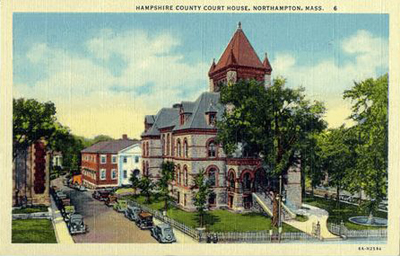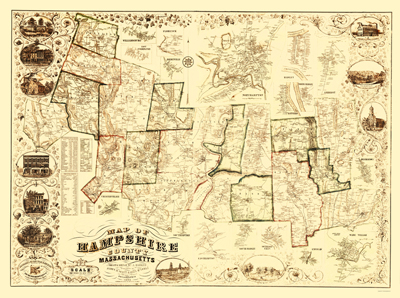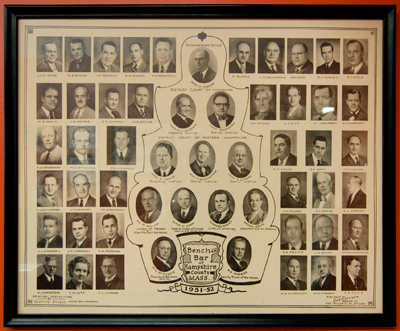History of the Hampshire County Bar Association
The search for the Hampshire County Bar Association’s history was prompted by another project, the 1999-2000 Hampden-Hampshire County Bar Associations’ Pictorial Membership Directory. It has been the tradition of other Bar Associations to include a list of past presidents within the introductory pages of such publications. The Hampshire County Bar Association (HCBA) had a limited amount of information contributed.
The Bar Association did not have a permanent office until 1980 when the Hampshire County Bar Advocates program was established. Prior to that time, the Bar Association office and files belonged to whoever was president from year to year. The work of the Bar Association and its meeting minutes were never collected into a comprehensive archive file.
Most headway on this project was made possible by a 1937 Works Progress Administration published index of the Hampshire Gazette. With the help of this index, the pieces of the missing history began to fall into place.
Hampshire Lawyers and Bar Association Foundation
The Hampshire County Bar Association was founded in 1878. At the close of a superior court session, a committee of attorneys reported to be in favor of establishing an Association of the Hampshire Bar, which should hold an annual meeting on the second day of the June term of each year, for mutual benefit and improvement. [1]
The Honorable Charles Delano was elected the first President of the Hampshire County Bar Association. He would hold that office until his death in 1886. Also elected were a treasurer and secretary. In addition to the officers, the Bar Association consisted of an Executive Committee, the Library Committee, the Committee on Bar Rules and the Committee on Rules and Regulations. In 1878, there were twenty-three attorneys within all of Hampshire County. The total number of active committee members was thirteen. 2
Memorials
In its early history, the only recorded public events were memorial services for deceased members. The services were generally held at special sessions of the superior court when the justices, “would listed to what the members of the Bar were pleased to say.” 3 These services were held during regular superior court sessions, copies were placed in the court record, the speeches were published in the newspaper and copies were given to the families of the deceased parties.
One may see how the lawyers of Hampshire County were regarded by their peers and community over one-hundred years ago. As stated at the memorial service for Charles Delano, the Bar Association deemed:
“the success of a lawyer was rather in the amount of knowledge he acquired of mankind and the business affairs of life, his familiarity with the principles of jurisprudence and their application to the varied interests of mankind, and in the confidence he secured in the community, where he lived and practiced his profession and in ability and integrity.”1
We catch another interesting glimpse of the practice of law in Hampshire County at the turn of the 19th Century from Delano’s memorial service where it is noted, “His dog has not been in court this term, but it is the first term for may years that he has not come in and passed the time.” 2
There is a lapse in the history of the HCBA between 1886 and 1917. The Bar Association either became esoteric or completely inactive. Hopefully, with further research, some events in this thirty-four year period will come to light.
In 1917, the Hampshire County Bar Association once again appears in the public arena with a memorial service for Judges W.P. Strictland, A. J. Fargo and Winslow H. Edwards. Both Judges Strickland and Fargo were founding members of the HCBA. In a 1920 memorial service Judge Mason remarked of HCBA member, T. G. Spaulding,”He was for several years prior to his death the president of the very informal organization known as the Hampshire County Bar Association, a position which by character and ability he was well qualified to fill.” 1 From Judge Mason’s remarks, we are able to ascertain the nature of the organization. One could assume that the Bar Association did not meet frequently and was strictly informal.
In 1934, the Hampshire County Bar Association gathered to remember its most illustrious member to date, President Calvin Coolidge. The memorial service “paid to Calvin Coolidge was in accord with custom of the county bar association to thus memorialize departed members, and took the place of the regular afternoon sitting of the superior court.” 2 Judge Henry P. Field stated in his address, “proud as we are of Coolidge as a statesman and as the most highly esteemed and trusted public man in all these United States, I prefer to think of him as our neighbor and friend.” 3
The Great Courthouse Debate(s)
Aside from memorial services for its members, the Hampshire County Bar Association’s only other known activity is joining in the public debate over courthouse construction. In 1883, a considerable number of the bar and other prominent citizens’ 4 petitioned the County Commissioners for a new courthouse. Judge William G. Bassett in his petition opens that, “the Court House at Northampton is inadequate to meet the public needs, unsafe as a repository of records, unhealthy for the officers of the courts and the county, jurors, and parties to causes, and the public resorting there for business, and inconvenient for the purposes for which it is used.” 1 This petition started the movement that would end in the 1887 dedication of the present “Old Northampton Courthouse.”
In 1957 it was believed that the Hampshire County Courthouse had long outlived purpose. John Daly, executive secretary to the Supreme Judicial Court, reported to the SJC, “the best that can be said of this court is that it is not quite as bad as Taunton” He continued:
“I recommend that this archaic building be torn down and the space used for parking in connection with the registry of deeds and probate court, which are directly behind it and a new courthouse for the superior and district courts be built outside the center.” 2
The issue would not be soon resolved. The courthouse debate simmered within Northampton and Hampshire County for another ten years.
The Hampshire County Bar Association got involved in the debate and in 1967 formed a committee to look for a solution to the courthouse problem. The HCBA committee, with members Jake Foley, Kenneth Laprade and Kenneth Bowen addressed the County Commissioners. The committee declared, “The present courthouse building is old and has outlived its purpose and should be destroyed.” 3
The debate continued on for another four years before renovations of the existing structure were decided upon. It would be another two years before any work on the project actually commenced. Luckily, the beautiful granite and brownstone monument on Main Street was never destroyed.
Public Service with a Look Towards the Future
The Hampshire County Bar Association was the sponsor of the first non-funded legal aid program in Massachusetts. In 1967, the HCBA, in conjunction with the Hampshire County Action Community, provided a volunteer attorney to assist low-income individuals with civil issues ranging from advice to representation at trials. 1
The Hampshire County Bar Association has grown from its original membership of 23 attorneys to a present membership total of 327. With the establishment of the Bar Advocate program in 1980, a permanent office and staff was established. The tradition of Bar Luncheons, Community Service Awards, and Legislative-Judicial Evenings took root at this time.
The Hampshire County Bar Association now sponsors many programs including the Lawyer Referral Service, Conciliation Service and the Massachusetts Bar Foundation-funded Domestic Relations Program for Children.
Additionally, the Hampshire County Bar Association was the first organization to sponsor an educational program for divorcing parents. In 1994, with the initiative from Judge Sean M. Dunphy and the HCBA’s Probate Court Committee, Parents and Children in Transition (PACT), was established. Today, courses based on the PACT curriculum are mandatory for divorcing parents of minor children throughout Massachusetts.
As Hampshire County continues to grow, so does the Bar Association and its history.
Footnotes
1, 2 A Bar Association Formed. The Hampshire Gazette. June 11, 1878.
3 Bar Tribute to Judge Forbes. The Hampshire Gazette, March 1, 1881.
1,2 Hon. Charles Delano: Tributes to His Memory and Worth by the Hampshire, Franklin & Hampden Bar. The Hampshire Gazette. February 27, 1883.
1 Members of the Bar Hold Memorial Service. The Hampshire Gazette. June 15, 1917.
2, 3 Coolidge’s Memory is Honored by the Hampshire Bar Association. The Hampshire Gazette. November 3, 1934.
4 Movement for a New or an Enlarged Courthouse. The Hampshire Gazette. June 26, 1883.
1 Movement for a New or an Enlarged Courthouse. The Hampshire Gazette. June 26, 1883.
2 Accomodatins of Courthouse said ‘Outrageous’. The Hampshire Gazette. August 12, 1957
3 Court Needed Now, Bar Assn. Declares. The Hampshire Gazette. September 15, 1967.
1 Legal Aid Program Surveyed by HCBA. The Hampshire Gazette. April 12, 1968.




